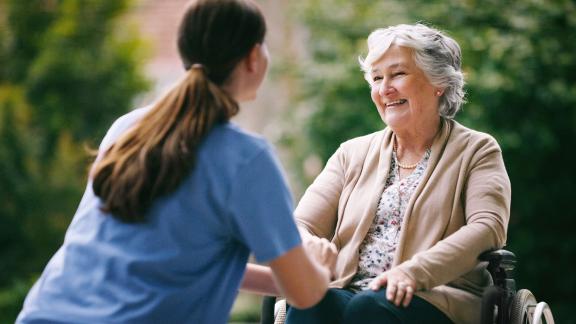September 2022: Actions taken to mitigate pressures in the health and social care system

Key themes
Preventing hospital admissions
Given the significant challenges to patient flow and the potential and actual harm that results from a prolonged hospital stay, it is essential that as many people as possible are supported in their own community, rather than in a hospital. Efforts are therefore focused on reducing avoidable hospital admissions.
Discharge to Recover and Assess
One of the main sources of system bottleneck is transfer out of Discharge to Recovery and Assess pathways to onward packages of domiciliary care. It is clear that assessing patients in hospital for ongoing and often long-term care can underestimate the ability of individuals to recover and improve. This can result in an over-provision of care and in some cases set a pattern of long-term care that becomes irreversible. A systematic approach to discharging patients from hospital to assess their strengths and identify care and support requirements is a major element of development across Wales.
Workforce
It is important to recognise that workforce supply is critical. Whilst recruitment efforts are important, engaging, developing and supporting current staff to aid retention is fundamental. Some of the developments are therefore focused on supporting staff.
Broadening care and support approaches
This focuses on widening the approaches to the provision of care and support, including working with the voluntary sector and families themselves. It also looks to flex the role of some elements of the care system to meet local pressures.
Preventing hospital admissions and providing care closer to home
Work is taking place within NHS organisations across Wales to avoid hospital admission for frail, older people. Examples include:
- Aneurin Bevan University Health Board (ABUHB) is working alongside the Welsh Ambulance Services NHS Trust (WAST) to review patients waiting at home to provide alternative pathways into urgent primary care centres or to other services as appropriate.
- ABUHB are planning to launch therapy services within the Emergency Department (ED) at the Grange University Hospital to arrange treatment for patients who have attended the ED. The service aims to reduce delays, prevent unnecessary admissions and enable the timely discharge of patients.
- Betsi Cadwaladr University Health Board (BCUHB) has rolled out its single integrated clinical assessment and triage pilot across north Wales. It offers nursing homes access to GP advice and supports identification of alternatives to hospital admission on a 24/7 basis. Work is ongoing with the care home sector to increase uptake and plans are being developed to roll into residential care settings.
- BCUHB continues to implement urgent primary care centres which provide an accessible appointment-based service to alleviate waiting times.
- BCUHB has commenced increased support for community advanced nurse practitioner (ANP) capacity in Wrexham County. Working jointly with primary care and WAST, the ANP will carry out clinical assessment of care home residents and support care home staff in patient management plans to avoid admission.
- Alongside WAST, BCUHB has piloted a service in the east area to enable occupational therapists or physiotherapists to travel with paramedics as an initial response to falls. The pilot demonstrated reduced conveyance to ED and facilitation of support service signposting.
- Cardiff and Vale University Health Board (CVUHB) is recruiting additional acute frailty consultants to support admission avoidance and reduce length of stay for frail patients when they do need to be admitted. Identification and assessment of frail patients within a few hours of their arrival to hospital enables timely treatment by multidisciplinary teams.
- CVUHB has been trialling an approach where GPs are stationed at the hospital front door and aim to provide assessment and alternatives to admission. During this period, on average 115 patients were seen per day, 48 per cent of which were directed away from the front door and 52 per cent being assigned an ED timeslot to help manage flow.
- CVUHB are piloting a diagnostic day case unit with the aim of improving flow and saving bed days. The introduction of the unit will provide the ED with additional options for patients rather than the traditional approach of admitting them to a ward while also providing greater opportunity for inpatients to receive their diagnostic procedure quicker.
- The surgical Same Day Emergency Care unit (SDEC) at University Hospital of Wales (UHW) allows rapid access to surgical treatment through ambulatory care. The unit allows teams to provide same-day assessment for patients and rapid access to diagnostics and treatment. ABUHB also implemented a SDEC at the Grange University Hospital as a safe alternative to admission.
- Cwm Taf Morgannwg University Health Board (CTMUHB) has implemented same day ambulatory medical and surgical assessment services to complete emergency assessment, treatment and same-day discharge to avoid admissions to EDs.
- CTMUHB introduced frailty assessment services in hospitals to reduce admissions for vulnerable people who attend EDs. An extension of the model to community clusters will treat people in the community.
- Digital Health and Care Wales (DHCW) has seen growth in users of the Welsh Clinical Portal to over 31,000. The clinical portal supports clinical workflow with functionality to view patient medical records (including summary GP record) and communicate key discharge information to primary care.
- Powys Teaching Health Board (PTHB) is undertaking falls assessment, education and promotion within care homes, focusing on frequent callers. The treatment escalation plans programme remains the top priority in the ongoing work stream for the Six Goals for Urgent and Emergency Care within the health board. The health board is making broader progress against the Six Goals ambition, with a focus on improving access to community diagnostic capacity, developing increased primary care support to frailty and multidisciplinary team (MDT) visiting, and strengthening community mental health support.
- A hospital department exclusively for frail older people was introduced by the older person’s assessment service in Swansea Bay University Health Board (SBUHB), with the aim of avoiding hospital stays. Targeted work was progressed on a partnership basis with third sector providers to increase the scope of provision available to support individuals following attendance at EDs to provide follow-up support as required, to reduce the likelihood of re-admission.
- WAST has invested in the development of advanced paramedic practitioners (APPs), supporting patient care in face-to-face assessment and remote clinical triage. Evidence shows that APPs convey around 30 per cent fewer patients to EDs than non-APPs.
- WAST has undertaken rapid improvement work on the 111 website, including improved search to make the site easier to use, better outcomes from symptom checkers and five new mental health symptom checkers. This formed the start of a wider piece of work to use digital tools to allow patients to make more informed choices about their health and care.
- WAST was commissioned to double the capacity of its clinical support desk, which provides remote clinical triage and assessment for 999 callers. The aim is to increase the number and proportion of callers whose needs can be met safely and more appropriately without the need for an ambulance to be dispatched (‘hear and treat’).
Discharge to Recover then Assess (D2RA)
Work has also been undertaken on the D2RA service:
- The Step Closer to Home ward at St Woolos Hospital in ABUHB has capacity for 10 patients who are medically optimised, but still need therapy and nursing support to retain their independence. The unit can assess the level of support patients need on discharge, often with a reduction to that being provided on admission.
- Marleyfield House in Flintshire has been jointly developed by BCUHB and Flintshire County Council. This provides dedicated D2RA beds to support safe and timely hospital discharge.
- Additional discharge coordinators have been appointed in CVUHB to reduce the amount of time qualified nurses spend organising packages of care to enable discharge. The coordinators attend ward rounds on their behalf and also chase up referrals. The health board’s medicine clinical board also introduced patient navigators to facilitate discharge and help relieve pressure for ward staff by guiding patients through the healthcare system.
- CVUHB’s single point of contact team has relocated from the community back to UHW, enabling more integration with clinical teams who organise patient discharges. In some instances, triage times have been reduced from three days to being done on the day.
- CTMUHB’s integrated flow process was extended to include a full process mapping project from the point of admission to the person’s return to their new baseline, giving them insight into days lost due to delays in discharge to the community.
- In PTHB, the D2RA service continues to operate the seven-day service with success and work is underway to have a focus on a “pull” approach. Reablement is also undergoing a recruitment drive for more therapists and support workers to reduce waiting times and response.
- SBUHB’s enhanced D2RA pathways support proactive identification of individuals ready for discharge through a multiagency partnership. This includes dynamic cross-sector solutions to promote independence based on need, ranging from third sector support, care packages or placement when considered appropriate.
Workforce
Historically, staff recruitment and retention has been challenging within the care sector. The WeCare.Wales campaign promote the benefits of working in care and provides insight into various job roles within the social care sector.
Examples in this area include:
- ABUHB has developed the new role of mental health peer mentors, attached to the Crisis Liaison Service. Based in the ED in the Grange University Hospital, they will support individuals with mental health issues and signpost to more appropriate organisations/settings.
- ABUHB has recruited extra health care support workers (HCSW) to the reablement teams to provide additional capacity.
- BCUHB has increased investment in additional clinical support staff to enhance capacity and support community resource teams. It is also working with Health Education and Improvement Wales to promote clinical assistant training for care home staff and additional funded places, including backfill for the care home.
- BCUHB’s regional workforce board is working on establishing a memorandum of understanding for social care to access the nursing / HCSW bank. As part of a Joint Health and Social Care proposal in Gwynedd, it is also exploring different staffing models to support staffing in nursing care homes.
- CVUHB’s nursing hub continues to centrally recruit health care support workers. During the first week of August 2022, 33 conditional offers were made, and all will undertake the ‘committed caring’ programme before they go onto respective wards. The Temporary Staff Department (TSD) recently recruited over 60 HCSWs onto the bank. A small number of HCSWs originate from overseas and CVUHB supports nurses to be able to undertake its adaptation programme to achieve their NMC PIN number.
- CVUHB has supported ward care through the appointment of therapy assistants, which has proved invaluable to improving patient experience. Dietetic assistants have also been appointed to support with nutritional and hydration needs during mealtimes across its emergency unit.
- In June 2021, DHCW launched the award-winning digital Welsh Nursing Care Record (WNCR), which enables nurses to spend more time caring for patients. For example, the WNCR released over 140 hours to patient care between April and August 2021, across five wards of one hospital.
- HEIW has created new care home education facilitator roles to encourage and enable more healthcare students to undertake placements within care homes. HEIW is also actively supporting the social care recruitment campaign We Care Wales.
- HEIW is establishing a new multi-professional primary and community care education and training unit, working alongside seven local health board academies. The aim is to expand the range of skills and professionals working within primary care and to support recruitment and retention.
- Hywel Dda University Health Board (HDUHB) are piloting a generic health and social care worker model in Ceredigion.
- Services such as a Resource Platform for care home and domiciliary staff have been launched to support staff in the social care sector. The Care Home Cymru team at Improvement Cymru worked in partnership with Public Health Wales NHS Trust and Welsh Government to identify the information that staff need to access, providing the links on a one-stop platform.
- To tackle some of the growing challenges across the health and care sector, PTHB is focusing on a range of widening access initiatives across the sector through its recently established Health & Care Academy. These include: rolling out the joint induction framework; applying for further funding to upscale the joint apprenticeship offer; working closely with Careers Wales and HEIW to scope the joint local work experience offer; bringing leaders together across a range of CPD initiatives titled ‘Digital Transformational Leadership’; piloting the Enhanced Health & Social Care qualification to year 11 and 12 school students as part of their curriculum; and working with third sector to increase volunteering opportunities.
- SBUHB, via the West Glamorgan Regional Partnership, developed a standard operating policy to support care homes that found themselves with a reduced workforce. This enabled the region to provide additional support to care homes via paid staff volunteers. In addition, the region developed joint recruitment for domiciliary care workers, who have been employed within SBUHB but seconded to local authorities until March 2022.
- WAST launched a volunteer strategy aimed at building awareness and embedding a culture of volunteering. As WAST’s remote clinical triage and assessment services increase, it is also working on ways of supporting staff to work from home, giving them increased flexibility whilst continuing to provide excellent clinical support.
Broadening care and support approaches
NHS leaders are working closely with local authority and voluntary sector partners to find solutions to challenges faced and minimise disruption.
- ABUHB has commissioned packages of care provision from a private domiciliary care agency and vacant care home beds as a short-term solution for patients waiting for long term point-of-care or care home placement. It is participating in twice-weekly deep dives with community hospital teams on patients delay and a daily link with local authority heads of services to foster a greater understanding of patient requirements.
- ABUHB has also undertaken a specific project to gain better understanding of the provision that can be delivered by the third sector in assisting early discharge.
- BCUHB is developing opportunities for ‘block-booking’ residential and nursing placements, with a focus on step-down and step-up care. Focus groups supported by Care Forum Wales have taken place with care home and domiciliary providers to co-design what is required to make step-down / step-up services achieve the optimal outcome.
- BCUHB has also utilised the Regional Integration Fund to increase the number of support workers and improve access to care in people’s own homes.
- BCUHB has put in place schemes to support medicine management, which can help prevent hospital admission. These are supported by increased education and training to enhance the competencies of the carer workforce, via a train the trainer programme.
- BCUHB has utilised partnership funding to commission Community Catalysts to support the development of micro-care enterprises across Wrexham and Denbighshire. This approach is proving to be particularly successful in increasing domiciliary care capacity in rural areas of Wrexham, which are known as ‘care dark-spots’.
- BCUHB has included a programme of work to support the ‘valuing of carers’ within its Integrated Medium-Term Plan (IMTP). This includes the development of a co-designed Carers Outcomes Framework and work is underway to enhance the role of carers through the adoption of the ‘triangle of care’ approach.
- CVUHB is aiming to replicate the successful cluster working it rolled out in the south-west locality on step-up support through the Community Interest Company (CIC) model. This resulted in significant decreases in secondary care referrals and emergency admissions in both UHW and University Hospital Llandough. It is the aim of CVUHB to replicate this model throughout other localities through a robust roll-out plan.
- CTMUHB has reviewed whether care can be provided in a different facility to release domiciliary care time. It is also supporting families to provide some care hours in the patient’s home.
- CTMUHB has also developed integrated community hubs, which is a model where health staff can be used where social care capacity is lacking.
- DHCW has supported NHS Wales organisations to reduce pressures in the health and social care system, with digital services moved to a new datacentre with improved resilience. This is alongside wider investment in digital networks, servers and other infrastructure, which deliver more capacity and reliability for the essential digital services which health and care professionals use every day.
- HDUHB has supported micro-enterprise home-based care in partnership with Community Catalysts in Pembrokeshire, which helps people to live independently and well at home.
- HDUHB has delivered bridging care – attracting greater interest through recruitment and developing this as a partnership model to consider for wider delivery. It also has a hub and spoke model of care provision aligned to care homes.
- PTHB has established micro-enterprise domiciliary care, with several enterprises expanding the offer which brought additional capacity into the system. The health board has now extended a two-year contract for a further year to introduce a new model of connecting with local people across a vast rural area. It has employed an additional local catalyst to broaden the service in the north of the county. This is with the aim of strengthening the local connections, raise the profile of community enterprise and increase the number of enquiries.
- PTHB’s home support service proposal continues on a locality basis, with a review to consider expansion alongside other commissioned third sectors.
- SBUHB is commissioning up to 100 care beds from the independent care home sector within the Swansea Bay footprint. This is in addition to the routine purchasing of beds for individuals requiring long-term care. The scheme will facilitate discharge from an acute hospital bed and provide ongoing NHS care for up to six weeks, pending finalisation of an individual’s ongoing needs.
- In SBUHB, volunteers have supported the emergency response through the use of care home volunteers and wider links with education, to establish potential volunteering opportunities to support the wider community.
- Due to the increased burden on unpaid carers, SBUHB reconfigured the Unpaid Carers Liaison Group to have an immediate action planning focus, tasked with generating a list of mitigating actions that can be taken with unpaid carers and in communities and services.
Across Wales, Care & Repair Cymru have strong operational links with NHS and social services partners, offering a range of services to ensure older people are well-supported. Their Hospital to a Healthier Home (H2HH) service is working with over 30 hospitals across five health boards to support safe hospital discharge, maintaining independence, and reducing the risks of hospital readmission. The H2HH service offers a rapid response remedial action for urgent works, such as home adaptations, temporary heating, urgent repairs, home safety, improvements to heating systems, disabled access, addressing damp, and home security for patients who are medically fit for discharge.
Conclusion
There are clear actions being taken across the NHS and local authorities to address the undeniable pressure in the social care sector, with initiatives taking place within discharge, workforce and prevention spaces. However, the long-standing issues within the care sector further add to the urgency in existing calls for governments across the UK to support integration between health and care and create a sustainable financial model for the sector.
We are calling on the Welsh Government to:
- Provide sustainable funding for social care with a fully funded pay rise to enable recruitment and retention, alongside greater overall investment and career progression opportunities.
- Support better integration between health and social services to achieve seamless care and support for the patient.
- Provide sufficient, ring-fenced funding and longer-term investment to transform out of hospital care and allow and long-term service development.
- Publish locality based delayed discharge data so there is clear information and evidence of the current issues in providing packages of care to people leaving hospital.
- Introduce performance measures that focus on quality-based outcomes, prevention, community services and whole-system collaboration.



